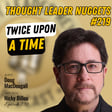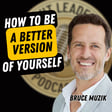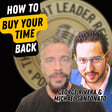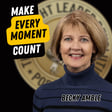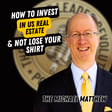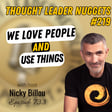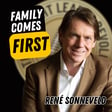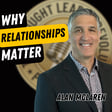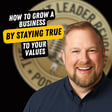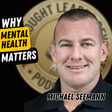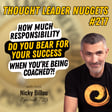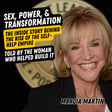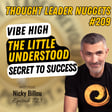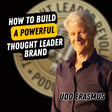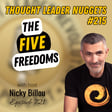Introduction to Mentoring and Coaching
00:00:03
Speaker
I do a lot of mentoring, a lot of coaching, a lot of just trying to help people kind of find their way with some of my experiences and how I can share those so they can become better entrepreneurs, better business people, better family men, better friends. You know you get to learn to be a leader. You get to learn to be a good follower You get to learn to be a good team player. You get to learn to be good on your own. You get to learn to be good with just one other person. You get to be ah accountable to other people and be counted on by your brethren. There's some gratitude with being content in the skills that you do have.
00:00:39
Speaker
right And you need to pat yourself on the back for acquiring those skills. But that idea of being your best always, it doesn't go away. You've got that sense of confidence, you've got that sense of skill, you've got that that inner strength, right that mental toughness. It only gets better as you move down the pipeline of being a team team guy.
Introduction to 'Thought Leader Revolution' Podcast
00:01:00
Speaker
Let me walk in your shoes, allow me to help you figure out how you're going to move forward with all the tools and experiences that we learned over time.
00:01:12
Speaker
Welcome to the Thought Leader Revolution with Nikki Ballou. Join the revolution. There's never been a better time in history to speak your truth, find your freedom, and make your fortune. Each week, we interview the world's top thought leaders and learn the secrets of how they built a six to seven figure practice. This episode has been brought to you by eCircleAcademy.com, the proven system to add six to seven figures a year to your thought leader practice.
00:01:42
Speaker
Welcome to another exciting episode of the podcast of Thought Leader Revolution. I'm your host, Nicky Baloo. And boy, do we have an amazing guest lined up for you
Guest Introduction: Chris Smith
00:01:52
Speaker
today. Today's guest is a former Navy SEAL. He is a leading thought leader when it comes to helping people reach their full potential. He owns a CrossFit gym. He owns a mindset educational company. I am speaking, of course, of no other than the one, ah the only, the legendary Chris Smith. Welcome to the show, Chris. Oh my God, Nick, your energy is as infectious as mine. This show is going to be loud for your piece. Got to tell you now, it's going to be loud, but I'm excited to be on the show, brother. How you doing?
00:02:27
Speaker
I am blessed and grateful, man. Thanks for coming on the show. I'm excited, too. We're going to rock it. We're going to roll it. So, brother, the folks who listen to this show are entrepreneurs, other than the great men and women that fight, bleed, and die, so the rest of us can live under the blanket of freedom. They're the greatest people in our society. Entrepreneurs, because of their vision, because of their focus, they move the human race forward. They listen to the show, not because I'm here every week. They're here for you. But before they can open themselves up to you, they got to get to know you. So tell us your backstory. How'd you get to be the great Chris Smith? Well, man, that's a lot of leading right there. Let's see backstory. Little old kid from Kansas.
00:03:15
Speaker
this Kansas. Kansas.
Chris Smith’s Journey to Navy SEALs
00:03:17
Speaker
Flatlands. Don't know why I got attracted to the ocean, but it's been calling in my head for a long, long, long time. Went from Kansas to Kansas City, went through school, ended up joining, I was an electronics engineer for a nine years, ended up joining the Navy, was in SEAL team for a long time, went to special missions unit, right? From there, got out of a special mission unit, started opening up my own businesses because that's where I thought I could make The second largest difference, right? First one, yeah, let's serve our country. Let's do great things. Let's make sure that we all can be here in the future to do the things we want to do. ah Ended up opening a lot of different companies. Like you said, I own Trident Mindset. I own Trident Athletics. I do a lot of mentoring, a lot of coaching, a lot of just trying to help people kind of find their way with some of my experiences and how I can share those so they can become
00:04:06
Speaker
better entrepreneurs, better business people, better family men, better, uh, better friends, you know, all those things. So that's kind of where I'm coming from. 58 years old. So I've got a lot of little dust under the belt. So yeah, willing to share and talk about anything. 58 years old. We are, we are you and I, man. yeah you see yeah yeah confess so Yeah. So I'm always excited to speak to a to a Navy SEAL because I've had a few of them on this show and on other shows and I've had other people from the special operations community on as well. There's a mindset
00:04:46
Speaker
that a man who has served in that capacity has, which the average person cannot comprehend, but it's a powerful mindset and getting a glimpse it of it and learning from it and learning how to apply it to my life has been part of what's made me better at everything that I do.
Motivation Behind Joining SEALs
00:05:06
Speaker
So share with me what the hell made you decide to go become a SEAL in the first place? And what did it take for you to be one of the men who went through the whole program without ringing the bell? Yeah, right. It's crazy little story. You know, I come from a relatively big family. My mother has 11 siblings. I've got a shit ton of of cousins, you know.
00:05:29
Speaker
um Honestly, a lot of things. But one thing that did set out my mind is, although it may sound kind of corny, the movie Red Dawn. The movie Red Dawn struck me at a time. The original, though. The original, right? The original Red Dawn. Not the original. It struck me at a time that whatever's going on in the world, it just hit me in my head that I really have no skills to support my family, to defend my family. I have no skills. Good athlete, I could do all the things that athletes could do. I could run, I could throw, I could catch, I could do all those things. But if something actually happened, I have no skills.
00:06:11
Speaker
I have no skills to help anyone do anything. And it bothered me for a long time. So, you know, me being me, I'm like, well, who are the best people in the United States that have the most skills to protect and serve? Who are the best people I can go and learn from to learn how to to give ah to learn from me to kind of protect my family and support our our country? That would be the SEAL teams. So I made that decision. I was 29 years old, right? So late in most people's careers. I was living a good life, had a good office job, doing all the engineering thing. You just recognize that I just didn't have any skills and I was really looking for someone, some place, some place to just kind of teach me some skills.
00:06:54
Speaker
to move forward in this world. And that's that's really one of the reasons I did it. Selfishly, though, I wanted to put myself up against the toughest training there was in in my mind at that time in the world, which I still kind of believe that, right? The toughest training that this country has to offer. Do I have what it takes? me, Chris Smith, at that time, 29 years old, probably making that decision around 26 or so, 131 pounds, never been in the ocean, no real skills. Like, man, do I have what it takes to join a elite force of men that go do good things to bad people for the right reasons? Do I have that inside? I don't know. Let me go put that to the test and find out, you know? So those two primary motivators of like, yeah, man, let's go get some skills and let's see, let's see how
00:07:43
Speaker
Tough you think you are. Let's see. Hey, man, do you have what it takes to join the world's elite? Those are my two primary ideas in my head at that time. So, OK, I say that's
Challenges in BUD/S Training
00:07:54
Speaker
pretty amazing. That's a lot, right? I'm sitting here listening to myself. I'm 56 years old. When I was in my teens, I did karate for a number of years. yeah Prior to that, I grew up in Iran. And Iran is um unlike the West. It is not a soft place. And I was a Christian in Iran.
00:08:18
Speaker
er and I experienced a lot of discrimination as a Christian from you know the Muslim majority there. They'd come and they'd just push me. I'd wear a cross. They'd rip it off my neck. They'd start fighting me. I had to learn how to fight, but this was as a kid. Yeah. Have I had I took a course ah put out by a man named Tim Larkin called Target Focus Training. And this was a three day course. I did it twice about how to defend myself. But if I spent a ton of time in my adult life learning how to defend myself, no. Is it one of the things that bothers me right now? Yeah. I mean, given the state of the world, I think I ought to go.
00:09:02
Speaker
learn how to defend myself, but a 56 year old man, is the military going to accept a man like me? Heck, though, they'll laugh me out of the out of the room and find out what they just said. Come on, man get the hell out of here. We're looking for youngins, right? Yeah. and oh But I totally understand your mind space and it makes me think, well, there's got to be some way. I can go get some elite training and I'm sure there is. I'm gonna i'm gonna think about that and and go out there and learn how to how to do what I need to do in order to be able to use deadly force at a moment's notice if need be. But you're 29, you got a good job, you're 131 pounds soaking wet and you said let me find out if I can do this. So you jump in with both feet, what happens then? Walk us through that aspect of the journey.
00:09:51
Speaker
Yeah. So I actually took him like six years. I wanted to be in my head. I had like this idea. I wanted to be a sell at like 23. I didn't make that. I'm sorry. 20. Yeah. 23. I didn't make that actual. Hey, you know what? I'm going to go until I was 28. And, you know, I had a girlfriend and a lot of money, all the stuff that, you know, you're doing trying to live that life in the world of like, yeah, man, I'm doing the right thing, you know, post school, all this stuff. I didn't make that decision until I was 28. And one of the things that helped me make that decision was, well, shit, the Navy started taking people at 29. So I had to go to boot camp before I turned 29 years old. Right. I get to boot camp crazy. I'm the oldest dude in my in my in my in my division by Jeez, you know what it is. like They're going at 18, 17, 18, 19 years. I'm already 20.
00:10:38
Speaker
um 28 years old. ah You were talking about discrimination as you were growing up too. ah Maybe at that time, I hadn't really felt that much discrimination, but I do remember a funny story in that time where you know you had to pass the entrance exam to get to BUDS before you turned 29. So I joined at 28. I'm going through boot camp. The test for everybody that was going to join one of the BSEALS came up, and they're like, all right, everybody wants to be a SEAL. Come on, we're going to do the SEAL entrance exam or whatever it is. right It consists of some push-ups and sit-ups and pull-ups. You get the idea. And a run.
00:11:15
Speaker
right It's just a run inside of a gym. You got your big heavy boots on, you got your pants on, your dungarees, you got all your stuff on. Now remember specifically, there were five black guys in that group, maybe five or six black guys in that group. And they gave each black guy an extra canteen of water. Not the white guys, not anybody else. It's like 20 people trying that out, right? And I was like, whoa, man, you know, I'm a grown man or I'm 28. And I'm like, why would you, why are you giving just the black guys an extra canteen of water? And I'm like, I don't think, oh, sickle cell. As far as I know, I'm not a doctor, I don't have a white coat. I'm just like, I don't think water cures sickle cell. Anyway, ended up passing the test, go to bugs. What?
00:12:00
Speaker
ah but Uh, it was hilarious anyway. Uh, yeah, go to Buzz. Crying a little kid. Um, hard, man. Like you've heard team guys talk about Buds. Buds is everything everybody says. It's, it's a hard place, man. You learn your, you learn your things there. Super, super hard. Uh, wasn't 100% successful when I first got in there, right? Got to, at that time Hell Week was fifth week. Um, I'm doing well the first four weeks. You know, I had trouble swimming, whatever. ah But during the fifth week, I like I said, I'm one hundred and thirty one hundred and thirty three pounds, something like that, because I probably pull on two pounds of muscle. Buds is freezing all the time. So ah during my hell week, we had this two mile swim of which me and my buddy had to swim two miles in a certain amount of time. And I'm like just small, you know, I'm a tiny little guy, freaking freezing my butt off, end up getting hypothermia in that swim.
00:13:03
Speaker
um that got me set back to the next class, right, got me set back to the next class. So I was a full benefit ah Buds candidate, Class 205 at that time, graduated Class 207. Full benefit guy, um registered the lowest rectal body temperature ever in Buds with an 88.4 rectal temperature, which is, I hope, still a Bud's record, you know, I don't want anybody to take that from me. But yeah, it's super, super tough, tough course. Yeah. So you went through the program. It was as tough as everybody said.
Post-BUD/S Training and SEAL Experience
00:13:42
Speaker
It is hard. Yeah. When you got through it and you were a Navy SEAL. What was that like? Um.
00:13:53
Speaker
You know the saying ah that that SEAL teams has, the only easy day was yesterday. Yep. It's the truth. Right. Like Bud's is nothing more than an entry point to go learn the skills to become a Navy SEAL. Hey, are you tough enough? Are you smart enough to understand what we're telling you? Can you pick up things fast enough? Are you going to quit or are you not going to quit? Are you that guy that has that caliber of doing the right thing for the right ah for the right reason all the time. Are you that guy? Can I count on you? Right. You're stacked on a door. Can I count on you to do your job correctly? Yeah. It's the litmus or the assessment. See is, is this a quality enough guy that we can actually go teach some real SEAL skills? Are you that guy? Right. So when you get to your SEAL team, you're still being tested.
00:14:45
Speaker
Right. You're still being vetted. Now's your time to learn the skills that you had in your head that Navy SEALs do. That's when that starts. And that is a joy. Right. People treat you different. You've already passed a test that you're not going to quit. Now you're worthy of the training and the skills that the SEAL teams are going to give you. Right. So it's a beautiful time. It's the best time ever because you get to go to every single cool guy's school. You get to learn how to jump, get to learn how to drive, get to learn how to shoot, get to learn how to fight. You get to learn all these things that people want. Right. You get to learn to be a leader. You get to learn to be a good
00:15:23
Speaker
follower You get to learn to be a good team player. You get to learn to be good on your own. You get to learn to be good with just one other person. You get to be ah accountable to other people and be counted on by your brethren. So it's an amazing place to be, right? It's just, you're an adult. They treat you like an adult. It's an amazing place to be. I wouldn't trade any of those days or moments for, just wouldn't trade those moments for anything. You graduated Buds. You're learning how to be a ah SEAL. They're teaching you all those deadly skills. so How long from graduating Buds till you and your heart and soul felt and believed, yeah, I got the skills I need. I can do anything to defend myself, defend my country, defend the people I love. Yeah. I would be lying if I didn't say, ah I don't think that journey ever goes away.
00:16:19
Speaker
I think the quest of learning new things and being better ever goes away. There's some gratitude with being content in the skills that you do have. right And you need to pat yourself on the back for acquiring those skills. But that idea of being your best always, it doesn't go away. I'm still a seeker, right? I still like to do hard things. I still, you know what? I went shooting with my buddy just the other day and I'm like, whoo, shooting is a perishable skill. I'm a little rusty.
00:16:51
Speaker
Let me back it up real quick, get the basics back on and then move forward fast. So that journey never really stops. I mean, you get good at a lot of things really fast, right? And you are 100% competent and everybody knows that and you're great, but you know that you can still get better. Yeah, but that's what I'm talking about. I get it. yeah You're a seeker. I understand you wanting to get better all the time. That's a journey that I'm on. And I think everybody in our space is in there. There's there's never a finish line. There's always another place to go. But I'm talking about from the time you graduated buds to the moment you were like, I'm a lethal badass. I'm nobody to mess with. How long was that? Oh, um,
00:17:35
Speaker
Yeah, you kind of figured that out maybe,
00:17:42
Speaker
ah maybe like your second platoon, because maybe your first platoon, you're in there, you got a job, you got things that people are counting on you to do, which is awesome. And you're constantly, you're in that learning state too. You're learning from guys that are better than you, you know, but you do have this wherewithal, Like, actually, you know, the answer really is as soon as you get out of bud. As soon as you get out of bud, you know, you're fucking, ain't nobody gonna hurt you. Like, you know that right away. You might not have all the skills, you know, but you know, you're pretty much unhurtable, right? And you take that confidence, you take that Schwade V with you to SEAL team and you just hone that craft. You sharpen that knife.
00:18:18
Speaker
So you know that um not like braggadociously, but you know that you've got that sense of confidence. You've got that sense of skill. You've got that that inner strength, right? That mental toughness. You have that when you graduate buds, it only gets better as you move down the pipeline of being a team team guy. just Tell me like when that is, because you just know, like, you know, when you walk into a room, you're like, man, I am super confident in this environment. You know, you might not know when you got that skill, but you know, when you walk into a room that people are like, wow, that guy's standing up tall, that guy's confident. Or, you know, when you feel less than that, right? So to pinpoint when that happens, that's a little challenging. That's a, it's kind of hard to answer for me. Like when, when that actually happens, because confidence is constantly developed, right? And it's a skill you should constantly be working on.
00:19:13
Speaker
Amen. we got okay That's what mental toughness really is. so so you you you're i like I like that word, unhurtable. I've never heard it that way. I'm actually going to call this episode unhurtable. ah yeah it's it's a good name It's a good name for a book for you. You ought to use that. David Godin wrote Can't Hurt Me, and you you can write unhurtable. I think it's cool. I'll write that, and I'll take notes for myself. Yeah, man. I love Goggins, but Goggins is one angry man. You're not angry. You're you're like a happy warrior. He's an angry warrior, you know? oh Yeah. Yeah. we head to I love Goggins. He's an angry, he's an angry mofo. You know what I'm saying? Yeah. That too, just he gets off like, oh man, you're like, hey, this is good. so it's it's It's a more relatable energy.
00:20:04
Speaker
Yeah, that's that's the beauty of being like a a silent warrior or the gray man. It's like i I'm not dissing the Goggins here, but I'm not like I don't feel like I need to go and pound my chest and be the thing to know who I am and how I impact and affect people. Right. Spend time in my aura. Get to know me. I'm more than just the thing. Right. I'm more than just the child. I'm a I'm a human being. I care. I love. I'm deadly. Right. Like all those things are are constantly in the work just to be awesome at being human. Amen, man. Amen. No. Amen. what's it Well said. Well said. OK, so you're in seals. How long did you stay with the teams?
Transition to Special Missions Unit
00:20:53
Speaker
Yeah, I was in regular SEAL team. I was at SEAL team five for about four or five years. Then I got picked up for a special missions unit, and I served the rest of my time in a special missions unit. So in the traditional think or our traditional thought, people here, oh, man, I went to regular SEAL team. They got picked up the dev group, and then I kind of moved along that journey. My path was a little bit different than an average team guy, I would say. is I didn't quite go the dev group route. I went to a special operations command, a different one, right? And I spent the rest of my time ah still learning new skills, still honing new craft, still supporting our country in a little bit of different capacity. um Yeah, and it was incredible experience. It's an incredible experience. Not many people. I was one of six skills. I got to do that. So I feel honored to be part of that.
00:21:51
Speaker
That's awesome. So what is the special missions unit? I never heard that. Heard of them before. Yeah, yeah, yeah. So you know how as you, as ah military services, you know, there's always like the pony tip of the spear, right? You go from, if you're in the army, you go from army and then you go to either reindeer or you go to special forces and you go to Delta and you keep climbing that line, that tier, if you will. um Special forces is a joint special operator operation operation command where all four services get a chance to pick some people to go and support just different mission sets.
00:22:25
Speaker
Right. So, yeah, I can saturate a battlefield with 500 dudes with guns and go kind of prosecute a target that way. As you kind of continue to climb that ladder, um your skill set develops into a sharper tool that you get pointed in very specific and mission critical directions. Right. So you become um Oh, let's use the word special, right? You become a special tool that's used again that's used to prosecute prosecute specific targets. So it's so it' just a different path, if you will, a different path. OK, all right, cool. I never heard of it before. I've never heard it before. That was interesting. So yeah you you were in the SEAL teams and special missions for a total of how long? I did 12 years in that kind of idea, in that kind of space.
00:23:21
Speaker
12 years. OK. Yeah. Cool. So what had you what had you transitioned from there to the world of ah
From Military to Coaching
00:23:31
Speaker
coaching? Yeah. Mentoring, you know, teaching what that that's a but that's a leap. What made you do that? It is a good journey, right? Like, you know, um um like I said, I joined the military late, right? So now I'm what, 40, mid 40s or whatever. I had to make decisions like, OK, am I going to continue to travel down this path of, you know, most people do 20 years in the military, um kind of in the same
00:24:01
Speaker
journey space, which is, oh, I'm going to continue to do the same thing for a while, hopefully move up the echelon, hopefully do cooler things, or can I get out and make a ah significant impact, right? That's the whole goal, or is to make a significant impact on people in a different avenue or a different space. I want to choose to create a opportunity to to impact people in a different space. Right. Like there's only so much impact you can do in one silo. So I was like, wow, you know what, this might be the time for me to kind of go out on my own, take the skills and the tools that I've learned. And can I put it in a different space? At that time I was doing adventure racing. um I was really into coaching. I was really into like impacting people through fitness. That was like my my tool I was using to to mentor and impact people. And I just couldn't just really couldn't serve both masters at that time.
00:24:52
Speaker
right I kind of got into CrossFit then and I was teaching ah people at my last unit. i was doing I was setting up groups. I was working for CrossFit and that space looked really, really exciting for me as another opportunity to impact people positively using fitness as a way to pass along or mentor, if you will, skills, tactics, ideas, thoughts, philosophies, like all these things. Well, how else can I apply those to people that I care about or people that are looking for for information or looking to better themselves. Right.
00:25:26
Speaker
The journey started while you were still in the military, then. but Yeah, it's our military. Right. Not that I was tired of doing what I was doing, but, you you know, if you if you're a if you're on a path to be. ah true, whole, and the best you that you can be. Sometimes you got to look far enough down the road. Sometimes you got to look at, you know, 10 moves ahead in the chess game to see where that's going to get you. Right. In the space that I was, I'm like, wow, I could stay in this space, but 10 moves down the road. I'm still going to be in this space. I'm only going to have so much of an effect and I wanted to have a greater impact. So I wanted to get out of that space before I'm, you know,
00:26:11
Speaker
stolen at 18 years or whatever, when to get out of that space and move it to a direction and start fresh and take the
Expanding Impact Beyond Military Experience
00:26:17
Speaker
the experiences I've had, the the tools I learned, and apply those to a different to a different demographic, to a different audience, to a different ah group of people that were seeking kind of what you were just thinking. You were 56 years old, right? fifty six thirty six yeah seeking I was like, wow, I don't have the skills to kind of I don't have those skills. Well, I have those skills and I want to share those skills, right? To the people that are looking for those things. So I was looking for a different avenue to kind of share those things. Yeah. ah Yeah. I get it, man. There's, um, I've got skills I share in my
Monetizing Expertise
00:26:51
Speaker
world. I help. Yeah. I help people who are, um, experts.
00:26:59
Speaker
I help them monetize. I'm good at that. I'm good at getting people paid. That's my shtick. That's how Michael Osterling, who introduced us, he's one of my clients. Yeah, he's awesome. yeah mo I've never heard him called Mo before, but that's cool. Michael came as Michael for the longest time. I've always called him Mo. Michael O. Michael O, yeah. emmo But that's good, Mo. I like it. I like it. but The skill sets that I have, I'm thrilled to share them with the right people. You know, it's important to help good people make money because I think there's a lot of charlatans that make money and I want to see the good people win. That's what's important to me. Yeah. But sharing skill sets that I want and one of the skill sets I want is I want to learn how to be deadly and habits have it under good control. Yeah. Yeah. I feel like this is kind of a I love doing podcasts, right? I am not the
00:27:53
Speaker
best self-promoter or like I don't like throwing in. cheesy little, oh, my God, do this because I got this company, but not a shameless plug. But we do have a company that teaches guys like you the skills they want to do without them kicked
Company Offering Practical Skills
00:28:09
Speaker
in the face or getting busted in the penis. Right. Like, hey, man, we can teach those skills in a better opportunity. We can teach you to shoot. We can teach you to jump. We can teach you to drive. We teach you all those things. So that's an opportunity. And there's a lot of people that kind of do that as well. You know, there's an opportunity there for Don't think that that's gone for you. Talk to guys like me. We can set you up, right? We can get you the things you
Learning from Guests and Personal Growth
00:28:31
Speaker
need. That's why your relationship is super important because you share what you know. I share what we learn, right? What I know. and relationship relationship now Amen. It's one of the important things about having a podcast
00:28:45
Speaker
appearances is there's an opportunity for not just for the audience to learn, but for me to learn. In fact, yeah my my ah my big secret of being a podcast host who's done close to 700 episodes that I've interviewed is I get a free coaching session from everybody that I bring on. And in some cases, like you said, ill I'll go beyond the coaching session in some limited cases. I'll ah i'll go take a program by a book, et cetera, et cetera. So, yeah, I don't believe that it's
00:29:16
Speaker
too late for me or anything like that. i just I won't be accepted by most militaries at this age unless there's a war. But yeah ah I absolutely know that you know as ah as a man who's ah fit and exercises, i I have the life force in me to be able to learn any skill that I need to learn in any arena of life. So, absolutely, 100%. So, yeah but but you didn't say that you want to join the military. and You said you want to learn the skills. I did. And that's what I want to learn. Yeah, exactly. That's what joining the military to learn the skills is not a path. yeah so You don't have to do that. And especially at your age, right? We have there's a lot of opportunities. I'm one of those opportunities that can help you teach the skills that you.
00:29:57
Speaker
I hope are seeking that most people go to the military forward. Like that's still an opportunity, right? That's not, that's not yeah yeah cloud debt. That's still an opportunity, right? Regardless of age, that's still a possibility and an opportunity. That's just taking a step in that direction. It's like, Oh, I want this. Well, where can go get it? Well, I know a guy that can go get it for me or help me get it. I mean, it's out in there, right? People, you know, like we are people, especially we'll say men in this situation, right? Like, oh, my God, if I was younger, if I was that. No, today is today, man. Today is today. We want to go do something. Let's take a step in that direction. There are people that can help you get there. Get out of your own way. Right. Get out of your own way. Just ask. Right. Just ask. Yeah.
00:30:44
Speaker
Amen. No, well said, powerfully said. So you decided after, you know, 15, 17 years in the military at the highest levels, you wanted to um transition out to impact people positively by sharing what you've learned with people in a variety of
Entrepreneurship and Mindset
00:31:05
Speaker
different areas. You did that and you became an entrepreneur. Now, people come into um my ecosystem, they become my clients, they listen to my podcast, because they're looking to learn from entrepreneurs like you. So you have a background as a CEO, so your mindset is pretty rock solid, right? You've got about as strong a mindset as ah as a human being can have. So how did you use that mindset to grow your business, to become successful, to establish a brand for yourself?
00:31:39
Speaker
Yeah, yeah. A couple of words that are current in mind right now. Discipline, focus, intention, right? Like ah tools you learn in the military is like, OK, we have a mission to execute. We've got a target to prosecute. We've got a goal that we want to hit. Well, we learn how to plan. We learn how to plan backwards plan to attack that goal and be successful at at that goal,
Planning and Problem-Solving Skills
00:32:04
Speaker
right? Before we leave to attack that project, whatever it is, we have a good solid plan and we know we're gonna be successful. It's the same tools we use in business. Hey, I got a project that's coming ahead. How am I gonna accomplish that project? What needs to be done? What do I need? What are my resources? How am I gonna get this done? And you have 100% confidence that project is going to um be successfully completed.
00:32:26
Speaker
But life goes as curved sometimes. We know that, whoa, that first plan didn't quite work, right? No plan survives first contact. No, it wasn't my second course of action. Was my third course of action. Can I pivot and still keep my confidence in my forward momentum to accomplish that task? Right. A lot of people lose energy when a hurdle comes or a hiccup comes and something gets in their way. Oh, I'm out. I don't have the understanding or the the the the foundation to bounce off of. Right. We're going to call that foundation of why we don't have that why or foundation to bounce off of or the tools to use to get over that obstacle so we can still be successful just because the door is locked. I mean, you can't go in the room.
00:33:09
Speaker
Sometimes you've got to kick it. Sometimes you've got to use a batting ram. If your goal is to get into the room, get into the room. Sometimes you've got to use a window. You've got to have the the intellectual the intellectual pivoting to still understand that the goal is what you're trying to acquire, not getting through the door. The goal is getting in the room. right so We use some of those tactics that I forementioned to get inside the room.
00:33:37
Speaker
The goal is the goal. You have to have operational flexibility. Operational flexibility because some people think just because something stood up and got in your way that the whole job is over. It's like, no, man, you should look at it the other way. What a wonderful opportunity to try something different. Right. Oh, I planned it. It didn't work out that way. What a wonderful opportunity to try a different route that I may have thought of earlier. Maybe I didn't. I got to be flexible enough to be successful. All right. And that's just called intention. You know, many years ago, I did NLP with an instructor. Her name was Mary Lucibi. And she had a saying and her saying went something like this. She said the most flexible element. I'm going to write this down as I say it to you. Yeah. In any system.
00:34:36
Speaker
Will. control that system.
00:34:44
Speaker
And that is pretty profound. Because what she's saying is if you're if you're inflexible, and you're going to say this has to be this way, but someone else with whom you're and in in a competition is flexible, and they're saying this does not have to be this way, the only thing that has to be is that I win, they're going to kick your that you're every time, every time, every time they're going to clean your clock every single time because they're thinking about the finish. You're thinking about your structure. Oh, this has to be step one, step two, step three, step four, step five in order to be successful. Doesn't always work like that. You know, the way I need to to be and I go to 3D, you know, to get to step five, I need to be able to be ah durable, right, pliable, flexible, and still have momentum to accomplish my task.
00:35:38
Speaker
right We have a bunch type of people out there. We have people that are um better way people. My way is always better. We have people that are right way people. Oh, this is the right way to get something done. right We have people that are contributors. you know I just want to be part of the team to get this thing done. right All those kind of people, there's nine of those different types of people we call those. You know, Simon Sinek uses it, Gary Sanchez uses it, the why. Because those people have different ways and tactics to accomplish the goal, and they are all right. All of them are right, but the person that is only right is usually going to be wrong. We have to think about the other ways to accomplish the task.
00:36:27
Speaker
just because I'm a better way person, which I am, because I always think that my way is better because it usually is, but I'm emotionally, I'm intelligent enough to know that, yeah, in my head, my way is better, but you know what? Nikki's way will probably work too.
Knowledge Sharing and Book Idea
00:36:44
Speaker
You know, Bob's got a good idea too, right? So I'm flexible in that space and knows that, you know, hey, I think my way is better, but we can try something else too and still give full support, you know, for that intention. Amen. Just endure will be inflexible. Right. I mean, we all know that the oak tree cracks in a storm in the willow winds always. Right. The oak tree cracks in a storm in the willow wind. I'd like to.
00:37:18
Speaker
Yeah. Yeah, these are good to write down. These are these are some good sayings.
00:37:26
Speaker
That sounds like it's an ancient Chinese proverb of some kind, you know, my Chris Smith is a little. ah You know, I've been in the world of.
00:37:41
Speaker
Non boasting. um not gloating, you know, I've been in this this underground world of doing hard things and the right thing for the right reasons and not really having to shout that to the world and being okay, being the gray man for the longest time. And one of my personal journeys is to be able to share and express some of that and, you know, take some gratitude. Oh, wow, thank you for letting, thank you, right? So my wife, she calls them, she was, Since I didn't want to, I don't know if I want to and I really write a book, but my wife's like, you should write a book. I'm like, no, you should write a book. So she was working on a little manuscript called Silly Shit My Husband Says, the Book of Chrysisms, right? A lot of knowledge of moms of things that pop out of my mouth randomly. But you you ought to write a book and you ought to use use your personal story as part of it and use it for attracting clients
00:38:34
Speaker
and attracting the people you want to serve. I think she's right. It's good that she's writing a book, but you ought to write your own book as well. Yeah, that's true. So Chris, if someone is interested in finding out about you, the work that you do, how they might be able to work with you, what's the best way?
Services Offered and Contact Information
00:38:49
Speaker
Best way is going to be csmith at tridentmindset.com. right so That's csmith at tridentmindset.com. right Me and my staff kind of manage that email. That's my catch all. It helps with ah physical training, we do mental training, we do adventures, we do a one-on-one kind of go to your house, kind of set you up. You know, a lot of people's like, oh yeah, can you help me with this or that? I'm like, man, I'm willing or my team is willing to go to you as well and help you live in your space.
00:39:21
Speaker
Because yes, I love online training. I love online mentorship. I love Zoom calling. I love all that stuff. But sometimes this face to face, like this is how I live my life. I go to work. I got kids. I got this. Here's my gym. Like having that in a virtual space, getting set up doesn't always work. So we try to have find opportunities that came in. Let's go share some time together. Let me walk in your shoes, allow me to help you figure out how you're going to move forward with all the tools and experiences that we learned over time, right? Inside of Trident Mindset, we have 12 strategies that we kind of teach people in one strategy a month to kind of get their mind in a tough place, right? Now, tough doesn't always have to be hard. Tough can be soft.
00:40:06
Speaker
right Yes, we should do hard things as hard things are great, but you
Importance of Soft and Hard Skills
00:40:09
Speaker
know what? We need to learn how to like listen. We learn how to meditate. We learn how to breathe. right Those are soft skills that you need to continue to evolve as a human being. Yes, I think you should be able to defend yourself and your and your family. And you might need to learn how to throw some blows. You've got to have to throw some blows. You might need to learn how to drive your car fast. You might need to learn how to shoot. You might need to learn how to throw a bow. All these different skills, we can make them fun and exciting for you in some type of adventure that, man, you're getting to scratch that itch that you wanted it way back then that we're now too old to do. We get to scratch that itch.
00:40:44
Speaker
it The time is not gone. The time is now. The problem is that people have the tendency to put shit in front of it and not make it important until it's too late. Like, why wait? Why procrastinate? Like, forward momentum is only taking the first step. Right? Let's go ahead and take that first step. Amen. So we're going to make sure we put that email address in the show notes. See Smith that tried my trident mindset.com. So folks, if you are interested in finding out about the work that Chris does use that email address, contact him, contact his team, get on his calendar, and you can figure out how he can help you. And you can figure out how you can get
00:41:29
Speaker
out of whatever limiting belief is getting in your way. Because I'll tell you, limiting beliefs are what's stopping you from living the life less ordinary. And you've got to do something about those limiting
Top Three Pieces of Advice
00:41:44
Speaker
beliefs. So Chris, we end off each episode by asking you, our guest expert, for your top three expert action steps. These are bullet point the three best pieces of advice that you have to give to me and to my listener. Go. First thing first, don't be afraid of the man in the mirror. The man in the mirror has the truth and has the answers. Have the balls to get in the mirror and ask yourself the tough questions. Who am I? What do I want? What's holding me back?
00:42:20
Speaker
In all my life's experiences, you cannot lie to the man in the mirror. He knows the truth. Second thing, don't be afraid of the blank page. A short pencil is better than a long memory. Write shit down. Some people call it journaling, some people call it noodling, whatever it is for you. Hey man, take the time to scribble something in a book that you can reflect on later, right? It's the fastest way they move forward. Third thing, ah go back to basics.
00:42:58
Speaker
Matt, I just heard my friend talk the other day, back to basics, right? Every sports team does it, every winning team does it. What do they do when they get to practice? They get back to basics, they learn the basics really, really well, and they move forward, right? I'm gonna give i'm gonna credit my friend Brian Shontosh for that one, because he just hammered it in my head this week and we spent some time together. Don't forget the basics. Don't focus on the bells and whistles. Don't forget the basics. The basics win ballgames. Base hits win ballgames. Those are my three top three at this moment. They might change tomorrow, but right now those are my top three. The first two won't change for sure. Yeah. Amen, man. Amen. I love it. I love it. Chris Smith, man, it was a lot of fun having you on the show. It was a real honor. We had a blast. The energy was high. Yeah. Thank you. We're on the show, man. Yeah. I appreciate you, my friend. Thank you. Express gratitude.
00:43:50
Speaker
Yeah, you bet. God bless. And I do ah another podcast for men. You ought to come on that as well. I think we could talk any time, man. I am really embracing my opportunity to to share and speak. So if you have me, I'd love to be on. Yeah, I will. Let's so yeah let's talk about it offline and find a time. So, listener, Chris Smith, the real deal. This is a man who has wisdom. He's got powerful, powerful insights to share. If you enjoyed what you heard, send them an email. And if you enjoyed what you heard, give us a like, give us a rating, give us a review. And if you got a friend who you think would benefit from this conversation, share it with your friend. Until next time, goodbye.
00:44:44
Speaker
This episode has been brought to you by eCircleAcademy.com, the proven system to add six to seven figures a year to your thought leader practice.


